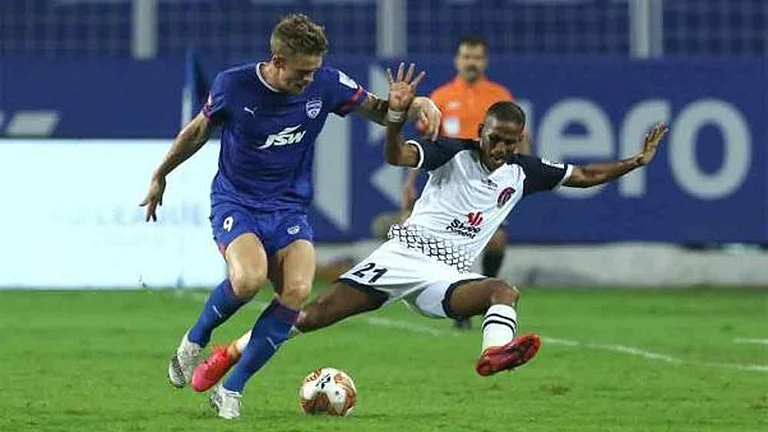All ideas are immortalised in myths, none more so than love and heartbreak. The exchange of coy stares, the unseen aching of hearts, stolen touches that send shivers down the spine—the intensely personal but quotidian feelings transcend into everlast through the adroit ministrations of a bard in search of a corner of fame. Despite its troubled present, the civilisational faultline that passes through Kashmir’s verdant valleys and gurgling streams naturally presents the perfect setting for romance, yearning, separation and hope.
It begins in the 16th century and is still said to resonate in the Valley’s doleful air. As the story goes, the Mughals had annexed the independent kingdom of Kashmir and exiled the last king, Yousuf Shah Chak, to Bihar, leaving his beloved queen Habba Khatun wailing, wandering and singing mournfully, all alone across the Valley. In the wilderness she sings for her beloved, pleading for one glimpse, promising she would wait at the gates of Mount Harmukh. Yousuf never returns, but 500 years down the line, Kashmiris believe Habba’s songs still echo in the Valley. It is a story they live every day. In happy times and sad, Habba Khatun’s sensuous songs make both young and old emotional. With the never-ending conflict bringing tragedies to every doorstep, Habba’s lyrics of separation amplify their mourning.
ALSO READ: Total Eclipse Of The Heart
“Her language is direct, simple and melodious,” says poet and actor Bashir Dada, adding that a true Kashmiri is bound to relate to her story. “There are Yousufs in jails for years, some killed and buried secretly in far-off places. I know many Yousufs and have witnessed the wailing of many Habba Khatuns,” says Dada. On August 17, 2018, Mumbai-based Kashmiri singer and musician Jaan Nissar Lone and classically-trained singer Sniti Mishra released a video in memory of Yousuf and Habba Khatun. It was an instant hit. The song was already sung by different singers over the decades. What was unique about their rendition is that they recreated the story with Lone playing Yousuf, Diana Khan playing Habba, and Ajay Gosallia Emperor Akbar. Harmukh bartal praray madano yi dapham ti lagayo/Posh dapham gulab lagay madano yi dapham ti lagayo [At the gates of (Mount) Harmukh I’ll wait for you, my love, whatever you ask I’ll offer you. Ask for a flower on your forehead, I’ll offer you a rose my love, whatever you ask I’ll offer you.] The song has over seven million views online.
Mughal contribution to Kashmiri art, culture, heritage, architecture after the conquest is immense. They also gave Kashmir the first recorded poetry of separation and pain in Habba Khatun, and every generation tries to give a new voice to her lyrics. In 1977, Kashmiri writer Bashir Budgami produced the first feature film for Doordarshan named Habba Khatun, with Abdul Gani Khan playing Yousuf, Rita Razdan playing Habba. The songs sung by Shameema Dev Azad set to music by Nasar Ullah Khan have enthralled generations since then. Budgami says he chose Habba Khatun as the subject for a reason. “Habba Khatun is part of our cultural heritage. Her poetry evokes different emotions of love, solitude and suffering. Above all, it was a story about the last independent kingdom of Kashmir, its last king and his beloved poetess queen. What better subject will you get if you are making a film on Kashmir?” he asks. The film, running for around 2 hours and 15 minutes, brought Kashmir to a standstill at a time when there were few homes with TV sets and neighbours would throng the houses of those with TVs. The film compelled then J&K CM Sheikh Abdullah to visit Chak’s grave at Biswak village in Bihar’s Nalanda district the same year. After failing to conquer Kashmir militarily, Akbar succeeded in the second attempt to lure Yousuf Shah Chak, who ruled Kashmir from 1579 to 1586, for talks to Delhi, where he was arrested. He gave him land in the Islampur block of Nalanda district. The place where the last Kashmiri king settled, came to be known as Kashmir Chak. In 1592, he was buried in Biswak, adjacent to Kashmir Chak.
ALSO READ: ‘Laab’ In The Mountains

Without You A shikara at the Dal Lake, Srinagar. Photograph by Aradhana Seth
During the PDP-BJP government, it was said that then cultural minister Haseeb Drabu was working on a proposal to bring back Chak’s mortal remains to the Valley, but last heard, the monument was under threat from encroachers. Legend has it that one day, Yousuf spotted Habba, named Zoon (meaning moon) by her parents, in the fields while she was tending their sheep. The nature-loving king was riding alone when he heard Habba’s voice and fell in love with it. Waerwen seet waare chas nou, chaar kar moun maalineo ho [All is not well with me at my husband’s house, relieve me of my troubles, Oh my parents’ clan]
Habba too fell for the handsome royal having no idea of his pedigree. It is said the king freed her from her earlier marriage that was full of torment and agony. But her love didn’t last long. She could not accompany Yousuf to jail and lived in Kashmir for about 20 years more, wandering around, what historians say “without attachments or possessions”, and some say was buried at Pantha Chowk at Srinagar, overlooking River Jhelum. Others say she is buried adjacent to Yousuf’s grave at Biswak.
Doyen of Kashmiri literature, the late Akhtar Mohi-ud-din, describes Habba Khatun as the first “poetess of Kashmir who made sensuous love the subject of her poetry”. “Her poems, written in the popular form Watsun, are clear and passionate. The poems express feelings of a woman intensely in love and ready to abandon everything for the union with her beloved, who is far away from her, not only by distance, but also legal hurdles.” Mohi-ud-din here refers to “hurdles” as King Akbar’s “deceit and treachery” with Yousuf “after inviting him to hold talks on equal footing”. “Therefore, her poetry has deeper meaning. Her apparent yearning for her beloved was, in effect, the voice of the people for freedom from the yoke of slavery.”
Over the years, Kashmir’s political situation hasn’t changed, with poets and litterateurs talking in metaphors fearing State repression. And the masses readily take recourse in Habba Khatun to relive their tales of agony. RJ Vijdan, popular anchor on Mirchi TV, says Habba Khatun’s poetry is not unknown to the new generation in Kashmir. “She laments about a situation in her family, that has not changed for us. She wails about the separation of her beloved who was arrested and exiled. That too hasn’t changed,” he adds.
There is no dearth of Kashmiri poets who have come up with lyrical love songs in these five centuries, from Rasul Mir to today’s Naseem Shafai and others, but it is the legend of Habba that lives on. Her songs, sung by rising singer-songwriter Ali Saffudin, leave the audience spellbound. Gah choun pewaan gati, aki lati yee hem naa [Your light illumines the darkness, will you come to me once] Yaare daadi wanej fati, aki lati yee ham na [Your separation has broken my heart into pieces, will you come to me once].
The comments on the YouTuve video of this Habba Khatun song sung by Saffudin are telling. Even when couples meet to talk over coffee in the highly militarised zone they mostly talk about the conflict. It creeps into their blandishments. There is limited time to meet. The Valley shuts down after 6 p.m. By evening, every youngster should be home. The spaces for meetings are limited. In the past decade, couples would meet at beautifully decorated restaurants in Srinagar and other towns. The conflict enters the exchanges of couples involuntarily, as terms like crackdown, encounter, fake encounter, bunkers, CASOs, Gypsy, cargo, tuluk (lifted), rutukh (arrested), murukh ha (killed)—have become part of the daily lexicon. Even if you don’t want to talk about it, the situation compels you to. The politically suave, young generation of Kashmiri lovers talk about their political ideologies, and at times fight over them. If the romance is between a Kashmiri and someone from another state, they too talk of politics, books, movies, with Kashmiris mostly taking radical positions.
ALSO READ: You Are Making My Grey Glow
Saffudin says there is nothing political about Habba’s poetry, but at the same time, there is nothing apolitical about it either. He says she was a poet and also the queen of Kashmir’s last genuine independent ruler. “That makes her poetry significant. The context of the last queen of Kashmir singing and wailing for the last king of Kashmir makes her poetry leave a deep impact,” says Saffudin. Saffudin goes further and says there are two aspects of her poetry, mysticism and love. “What makes Habba distinct is talking persistently about the loss of the one you loved. She is witness to that loss, she has suffered that loss, she lives that loss and her wailing never reached any conclusion. We are also witnessing that loss every day. Our wails haven’t reached any conclusion,” says Saffudin. “Whenever I say I am going to sing Habba’s lyrics, I see happiness among Kashmiri audiences, as they believe it is their song and the people feel connected. That makes her story our story."
(This appeared in the print edition as "Lament of Separation")
ALSO READ
By Naseer Ganai in Srinagar


























